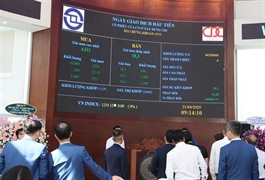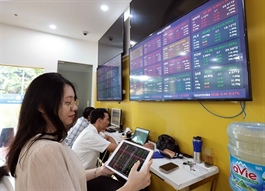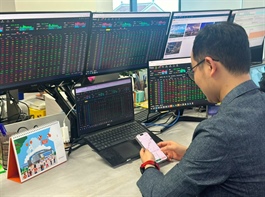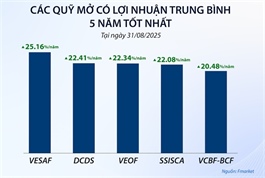Stock market enters pivotal point with cautious optimism
Stock market enters pivotal point with cautious optimism
Vietnam’s stock market has been buoyed by surging domestic liquidity and policy support, yet analysts warn that stretched valuations, continued foreign outflows, and upcoming global monetary policy shifts may pose challenges.
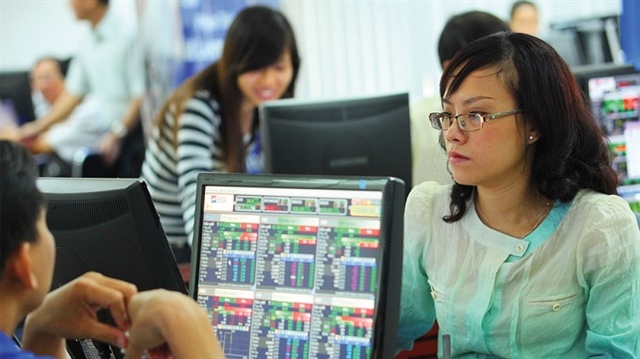
A market classification review by FTSE Russell next month could be crucial, photo Le Toan |
The VN-Index ended August at a record 1,688 points, an advance of more than 400 points since the start of the year. Liquidity also reached new heights, with trading value regularly exceeding $2 billion per session and once crossing the $3 billion threshold, underscoring robust domestic participation alongside steady policy-driven momentum.
While the rally has reinforced confidence in the market’s near-term direction, analysts note that rising valuations, sustained foreign net selling, and uncertainty over global rate decisions may heighten volatility.
In a report released on September 3, MB Securities (MBS) noted that the market’s price-to-earnings ratio had climbed to nearly 15.3 times, above the three-year average of 13.3 times. The VN30 and mid-cap groups have already broken through their historical averages, while the small-cap segment has lagged behind, trading at a price-to-earnings ratio of 12.9 times compared with its three-year average of 15.5 times.
MBS said momentum is showing signs of slowing as the VN-Index approaches the 1,700-point threshold. In the final week of August alone, half of the index’s 37-point gain was driven by just a few large-cap stocks. “Such a narrow base of support is worth watching, as it suggests the rally may be reliant on only a handful of key names,” MBS warned.
Another headwind comes from foreign net selling. Outflows reached a record $1.7 billion in August, which was the heaviest single month of selling on record. This brought total foreign net sales in 2024 to $3.6 billion.
Liquidity has also shown early signs of peaking. In the last week of August, average trading value fell 27 per cent compared to the week before. While securities stocks continued to attract fresh money and rose by 5 per cent week-on-week, most other groups lost ground, with some declining by more than 50 per cent. Current flows are heavily concentrated in banking (30 per cent of market liquidity) and securities (24 per cent).
MBS identified FTSE Russell’s market classification review in early October as the most important short-term catalyst. “The performance of securities stocks in the first half of September may provide a leading signal as to whether Vietnam will secure an upgrade to secondary emerging market status,” the brokerage stated.
Globally, monetary easing remains a key theme. The US Federal Reserve is widely expected to cut rates at its September 17 meeting, while the European Central Bank is pressing ahead with plans to bring policy rates below 2 per cent. Such moves could create a more supportive environment for risk assets.
Domestically, Vietnam continues to pursue an accommodative policy stance. Lending rates remain low, retail consumption is strengthening, and public investment has fiscal space to expand further. Policymakers are expected to accelerate disbursement of public investment and credit growth in the final months of the year to help secure national growth targets.
Nguyen The Minh, head of Research and Development for Retail Clients at Yuanta Securities Vietnam, underlined the relative resilience of Vietnamese equities compared with other asset classes.
“The VN-Index continues to deliver stronger performance than many global markets and alternative investments,” he told VIR. “Expectations for a Fed rate cut are crucial. Markets are pricing in an 87.6 per cent chance of a cut in September. Recent Fed statements have prioritised growth and employment, which has reinforced investor confidence worldwide. That optimism is spilling into Vietnamese equities.”
- 10:41 16/09/2025








